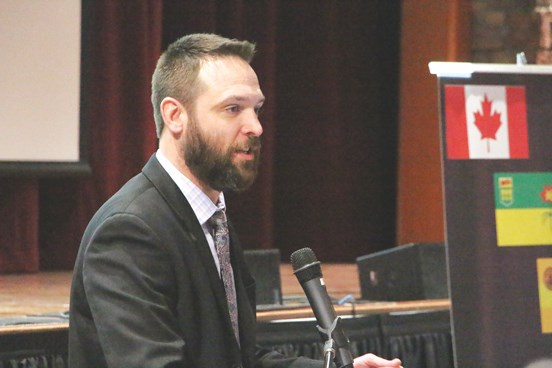Ask lawyer Mark Persick to talk about the laws surrounding marijuana next year and his presentation might be very different. Five years from now, it will be different still. Canada is heading into the unknown with the legalization of marijuana. Persick spoke to a sold-out Chamber of Commerce luncheon about what we know right now about the laws surrounding cannabis in Canada, as businesses want to know how legalization is going to affect how they do business and what their rights are with their employees.
“It’s a change in legislation and it’s a hot button topic, so I’m not surprised so many people are curious about it.”
While the medicinal use has been sorted out over the years through case law as that became a legal option, Persick explains that recreational marijuana opens up an entirely different set of questions, and also makes people take a harder look at medicinal use because it’s back to the forefront of their mind. Given that it’s new territory, he expects many businesses will be working out how they deal with it in their own work. Recreational and medicinal use are very different use cases and as a result also have very different laws surrounding them - people have a right to their prescribed medication, while people don’t have a right to something consumed for recreation, for example.
“Whether or not it’s your right as an employer to know depends on the circumstances. That is a big issue, and something that we would advise any of our clients to seek legal advice on based on the specific circumstances, but it’s something of concern.”
Some things we do know from the framework are that in Saskatchewan residents will have to be 19 years of age or older to purchase recreational marijuana. It will be sold privately through licensed businesses and regulated by the Saskatchewan Liquor and Gaming Authority. It will also be treated the same as alcohol in terms of impaired driving, with significant license suspensions for driving while high.
Driving also happens to be one of the areas where we are running into an unknown, Persick explains. While there are tests to determine that THC, the impairing ingredient in marijuana, is in someone’s system, it also happens to stay within a person’s system for a very long time due to being fat soluble.
“The reality right now is that there is just no test that can determine impairment. It can determine if there is THC in the blood, some tests are more reliable than others, but right now the level of impairment doesn’t have any scientific backing in tests that are there right now.”
With it being early days for cannabis regulation, Persick knows that it’s difficult how to tell how legalization will work out in the long term.
“Although the legislation is coming into effect this year, the typical routine is that legislation comes in, there are a few test cases, people don’t like the way things go, or there are just a few questions that go before the court, and that’s how we figure out what the rules are. It’s tested in court and the case law gives us guidance.”
Naturally, Persick admits that no business wants to be one of those test cases, and he recommends that they seek legal advice if they have any questions about their own policies.
“It’s nice when we have that guidance but you don’t necessarily want to be the people involved in setting the rules.”
The Yorkton Chamber of Commerce will also host a Cannabis 101 workshop to help clear the air about what marijuana legalization means for business. That will be at St. Mary’s Cultural Centre on April 4 from 9:30 a.m. to 3:30 p.m.



